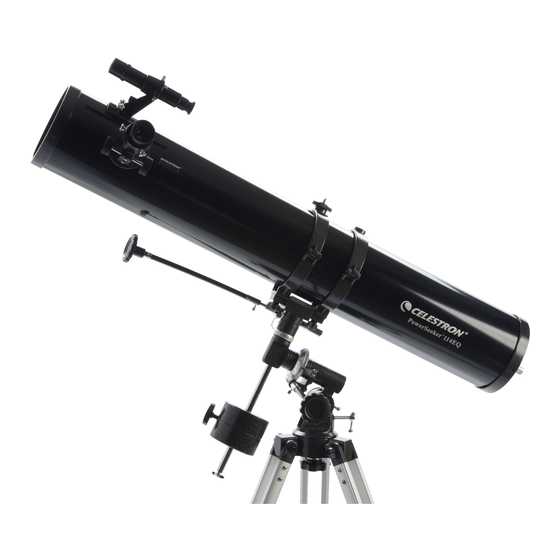- ページ 7
望遠鏡 Celestron FirstScope 114のPDF 取扱説明書をオンラインで閲覧またはダウンロードできます。Celestron FirstScope 114 10 ページ。 3"/4.5" newtonian telesccope
Celestron FirstScope 114 にも: 取扱説明書 (16 ページ), 取扱説明書 (17 ページ), 取扱説明書 (16 ページ), ユーザーマニュアル (16 ページ), クイック・セットアップ・マニュアル (2 ページ)

When observing with a Newtonian reflector telescope, the image seen will be correct for daytime viewing.
However the image will be rotated depending on the position of the focuser relative to the optical tube.
Newtonian telescopes are designed for astronomical use rather than for daytime land viewing. The finderscope
will always give inverted (up-side-down and backwards) images.
The magnification (or power) of a telescope varies depending upon the focal length of the eyepiece being used and
the focal length of the telescope.
The PowerSeeker 114 telescope has a focal length of 900mm and comes with a 20mm 1¼" eyepiece. To calculate
magnification, use the following formula, in which FL = focal length:
Therefore, if you use the 20mm eyepiece your magnification is 900/20 = 45x. The same formula can be applied to
any of your eyepieces.
Important!
Magnification through any telescope has its limits. These limits are determined by the laws of optics and the nature
of the human eye. Most of your viewing will be done in the range of 50x to 130x. Higher powers are used mainly
for lunar and sometimes planetary observing where you can greatly enlarge the image and the atmospheric conditions
are near perfect. The images at extremely high powers magnify the image, but remember that the contrast will be
very low due to the high magnification. For the brightest images with the most contrast, start by using the lower
power eyepiece with a smaller image scale.
The following magnification levels can be achieved when using the standard eyepieces in conjunction with the 3x
Barlow lens:
With proper care, your telescope should rarely need any maintenance work. To maintain your telescope in the best
possible condition, observe the follow suggestions:
1.
When your telescope isn't in use, replace all lens covers to keep dust and contaminants off the optical surfaces.
2.
A small amount of dust on any optical surface isn't a problem and doesn't need to be removed. If the dust
builds up, then use a can of compressed air and a camels hair brush to remove the dust. To remove fingerprints
or other contaminants, use an optical cleaning kit or the Celestron Lens Pen (#93575).
3.
If the inside of the objective lens needs cleaning, it should be done by a professional. Either have your
instrument serviced by a telescope repair facility or return it to the factory for servicing.
I
m
a
g
e
O
I
m
a
g
e
O
M
a
g
n
i
M
a
g
n
i
Magnification =
Eyepiece
Magnification
20mm
45x
4mm
225x
T
E
L
E
S
C
O
P
E
T
E
L
E
S
C
O
P
E
r
i
e
n
t
a
t
i
o
n
r
i
e
n
t
a
t
i
o
n
f
i
c
a
t
i
o
n
f
i
c
a
t
i
o
n
FL (telescope) in mm
FL (eyepiece) in mm
Mag. with 3x Barlow
Lens
135x
675x
M
A
I
N
T
E
N
A
N
C
E
M
A
I
N
T
E
N
A
N
C
E
7
